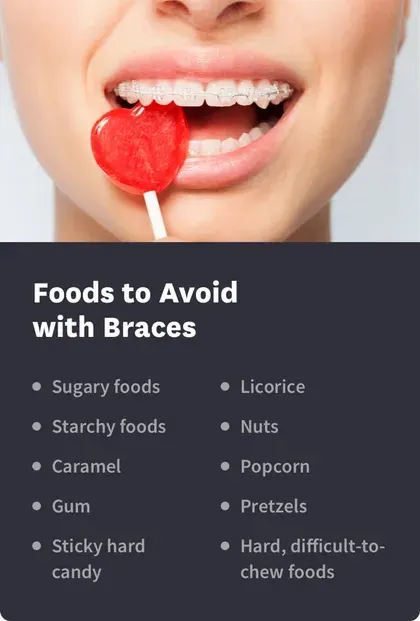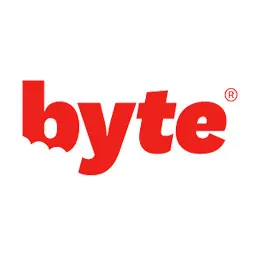What You Can and Can’t Eat with Braces

Table of Contents
- Key Facts
- What Can You Eat with Braces?
- Foods To Avoid with Braces
- What Happens if you Eat the Wrong Foods?
- Importance of Watching What You Eat
- Tips for Eating with Braces
- Cleaning Braces after Eating
While some people have healthy teeth and a perfect smile from childhood on, many others have orthodontic problems that need correction. Braces offer an effective way of adjusting dental arrangements to give you the picture-perfect smile.
But getting braces comes with its challenges that include modification in the types of food you consume, plus adjustments in oral hygiene practices.
For optimum results in the shortest time possible, it’s essential to know what foods you can eat as a braces-wearer and which ones to avoid.
Key Facts about Eating with Braces
Most people will have a normal diet during braces treatment, but making a few modifications can help to ensure less discomfort and a lower risk of oral health problems or braces damage.
Some soft and easy-to-chew foods may be the best option for when you’re getting used to your braces or are sore from a tightening or adjustment. These include soft-cooked vegetables, scrambled eggs, pasta, oatmeal, and purees.
Foods like leafy greens, yogurt, fish, and cheese contain vitamins and minerals that can help to strengthen and protect the teeth during braces treatment.
Some foods should be avoided while wearing braces in order to prevent decay or damage. These include overly sugary or starchy foods, chewy and sticky foods, and hard foods.
What Can You Eat with Braces?
While most people will be able to have a relatively normal diet with braces, there are certain foods that are easier to eat while wearing them, especially after having them just put on or on days when they’re a bit sore from a tightening or adjustment.
These are some of the best foods to eat with braces:
Scrambled eggs
Oatmeal and overnight oats
Hummus
Soft-cooked veggies
Avocados
Pureed or soft vegetable soup
Smoothies
Soft-cooked, ground, or shredded meats
Polenta, pasta, noodles, and rice
Pancakes
Nut butters
Saltines or soft crackers or cookies
Soft tofu
Canned or cooked fruit
Softened tortillas
Soft or refried beans
Soft cheeses and cottage cheese
Applesauce
Mashed foods, such as potatoes, bananas, or cauliflower
In addition to eating easy-to-chew foods with braces, incorporating certain foods can help boost your oral health during your braces treatment. These include the following options:
Spinach and kale: These greens contain folic acid, calcium, and other nutrients that help strengthen teeth and protect gums.
Cheese: Cheese is high in calcium and phosphate, which helps balance the PH in the mouth. It also contains casein, a protein that helps strengthen tooth enamel.
Fish: Fatty fish like salmon contain enamel-enhancing phosphorus.
Yogurt: In addition to bone-building calcium, yogurt contains probiotics that help keep bad bacteria at bay.
Milk: Milk is high in calcium and helps lower acidity levels in the mouth.
Carrots: With an abundance of vitamin C, keratins, and calcium, carrots are a great oral health booster. When crunchy, carrots can help “wash” the teeth with saliva.
Walnuts: While many nuts contain calcium and other elements that are helpful to teeth, walnuts in particular are a powerhouse of tooth-boosting minerals and vitamins, including zinc, iron, and magnesium.
Tea: Tea contains levels of polyphenols, which are naturally occurring chemicals that may reduce inflammation and act as antioxidants. In order to avoid staining, you may want to consider white or green tea.
What Can You Not Eat with Braces?

While it can be tough to avoid certain foods you love while you wear braces, diet modification can make your dental journey more effective long term. The better your diet, the better your body takes care of itself, including your teeth.
It’s also important to remember that braces can make good oral hygiene more difficult and increase the risk of decay and gum disease. The space between the braces and teeth can become “hot spots” for bacteria and food particles to accumulate. They can also be hard to reach with a toothbrush or braces.
Braces can make it hard to chew certain foods. Eating after an adjustment or on a day where you can really feel the pressure of tooth movement can be less than comfortable, and some foods can make it worse.
Braces can also become damaged from intense biting or chewing. This can cause harm to your braces and slow treatment.
To best care for your teeth during treatment with braces, avoid the following:
Overly sugary and starchy food
Hard, difficult-to-chew foods
Sticky hard candy, gum, licorice, caramel, popcorn, apples, pretzels, and nuts
These are just some of the things you should avoid to prevent both dental decay and damage to the orthodontic treatment appliances.
What Happens If You Do Eat These Foods?
If you insist on eating whatever you want when you wear braces, including foods that are on the don’t-eat list, your orthodontist isn’t going to be pleased. Here are some of the things you risk if you consume foods you should avoid with braces:
Tooth decay, which is caused by the accumulation of debris from sugary substances around the brackets and bands
Damage to different components of the braces, which results from eating hard foods
Orthodontists advise limiting sugary foods and drinks while wearing braces because when sugar combines with saliva, it creates a sticky film that coats the teeth.
Why Is It Important to Watch What You Eat with Braces?
When you have braces, it’s important to avoid certain foods for these reasons:
Less discomfort: Having a foreign object in your mouth that exerts pressure on the teeth, gums, and jawbone is by itself an uncomfortable experience. If a food requires considerable force to chew, the pressure on the roots on your teeth is bound to increase and result in more discomfort.
Reduced risk of damage to braces: Unless you care for these orthodontic appliances properly, they will break loose — or just break — without achieving their intended goal. Hard foods such as nuts are more likely to break the bands or wires, rendering your braces ineffective.
Less tooth decay: Some foods are associated with a higher risk of enamel erosion and consequent tooth decay. For someone wearing braces, eating foods with high sugar content is asking for trouble. Debris will stick to your brackets, forming a medium for bacterial growth.
In the long term, these kinds of foods erode your enamel, setting the stage for cavities and other more serious dental problems.
Tips for Eating with Braces
Depending on the nature of your orthodontic issue, you are likely to wear braces from several months to years. Here are some tips on how to eat with braces:
Choose soft food. Softer delicacies, such as scrambled eggs, dairy products, or fruit drinks, will keep you healthy while reducing the soreness associated with monthly adjustments.
Avoid large chunks of meat or directly biting fruits like apples. Always chew carefully to prevent both discomfort and damage to the appliances.
When eating out, carry a travel oral care kit. Brushing and flossing after meals can help to fight off buildup in decay-prone spots around the braces.
Drink more water. Water is the best beverage for your teeth. It fights dry mouth, and it helps wash residue off teeth. Fluoride-enhanced water can also help strengthen teeth.
Try cutting hard-to-eat foods into small pieces. Fruits, meats, and even veggies like corn may be more manageable in smaller bites.
Be more mindful. It can take a while to get used to braces, but it helps to stay aware. Eating slowly and mindfully can help to avoid biting down on hard food (like a pretzel) without thinking or going for a chewy candy that will stick in your braces.
Embrace a more wholesome and balanced diet. Avoiding sugary foods isn’t only a good rule for when you’re wearing braces. It’s good guidance for any healthy diet. Eating nutritious whole foods can help you avoid decay-causing sweets. You’ll also ensure you get enough vitamins and nutrients for strong teeth.
Cleaning Braces after Eating
Regardless of the food you eat while wearing braces, maintaining oral hygiene is paramount. The crevices around these appliances and your teeth must be kept clean at all times.
After every meal, you should brush and floss your teeth to prevent plaque formation and decay. Poor oral health may also cause permanent discoloration that will be counterproductive to your goal of achieving a beautiful smile.
To clean your braces after eating, take off the removable parts such as elastics. Brush at an inclination of 45 degrees, cleaning each tooth in a circular pattern. Remove any food remains from below the wires by flossing using a threader.
Brush at least three times a day with each session lasting for approximately five minutes. Remember to clean the gums and the tongue as you would without braces. A bacterial mouthwash can also help in eradicating any organisms that remain trapped around the braces.
